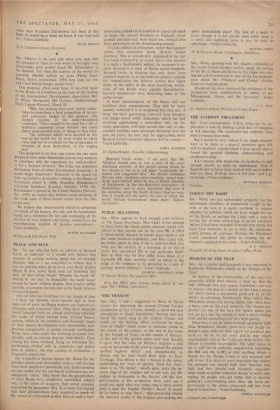increasingly petty points' faced Mr. Khrushchev at the Summit. Yet
when the nations of the world are spending £40,000 million on arms (Philip Noel- Baker, Nobel prizewinner, 1959) how long can one and a half billion hungry people wait?
One proposal offers some hope. It was first made in the House of Commons at the time of the reading of the International Development Association Bill, by Hilary Marquand, MP (Labour, Middlesbrough East). I quote Hansard, March 28. 'Why not propose that every nation under- takes to contribute a fixed proportion of its pre- sent armament budget to this purpose (the hungry peoples of the under-developed countries). 'There would he no need for a lot d technical arguments about whether one could detect underground tests, or things of that kind. . . • The resources which were devoted in this way to the world war on want would be taken away and not be available for the preparation of weapons of mass destruction, or [or waging war.'
This proposal in no way cuts across the two main proposals now under discussion; it in no way weakens . or interferes with the arguments for 'unilateralism' or for a 'balance of terror.' But it has one important distinction from all other disarmament proposals : it could begin tomorrow! Moreover if we recall (or look up) General de Gaulle's address to the House of Commons (April 6, 1960), President Eisenhower's television broadcast (London, October, 1959), Mr. Khrushchev's speech at the United Nations (Novem- ber, 1959), we realise that without much straining of the truth each of these Giants could claim the idea as his own.
We believe that disarmament linked to adventure on behalf of the hungry, the sick and the humiliated, based on a reverence for life and surpassing all the barriers of race religion and colour, would have the overwhelming support of peoples everywhere.— Yours faithfully.
OLWF.N BATTERSBY






































 Previous page
Previous page